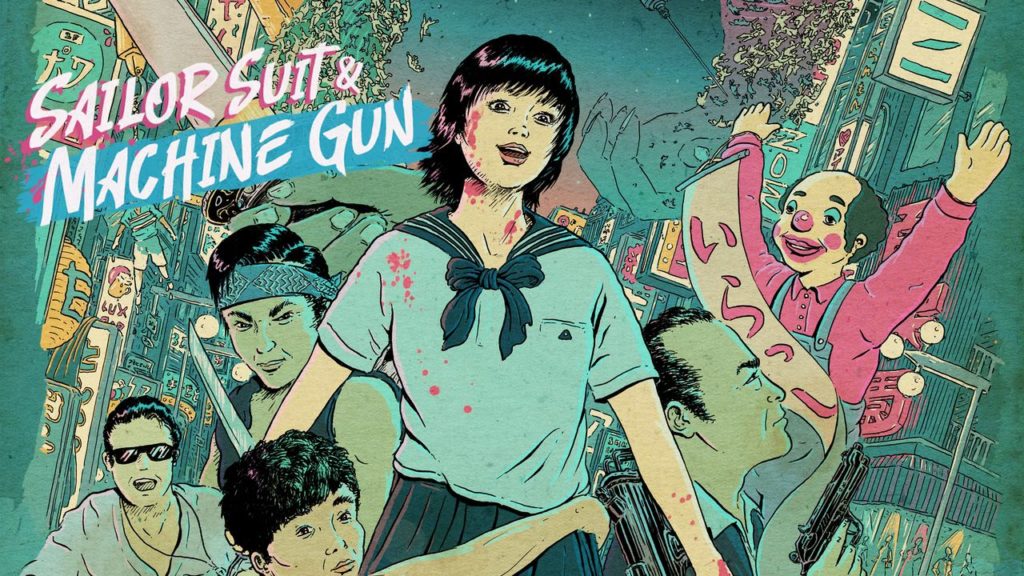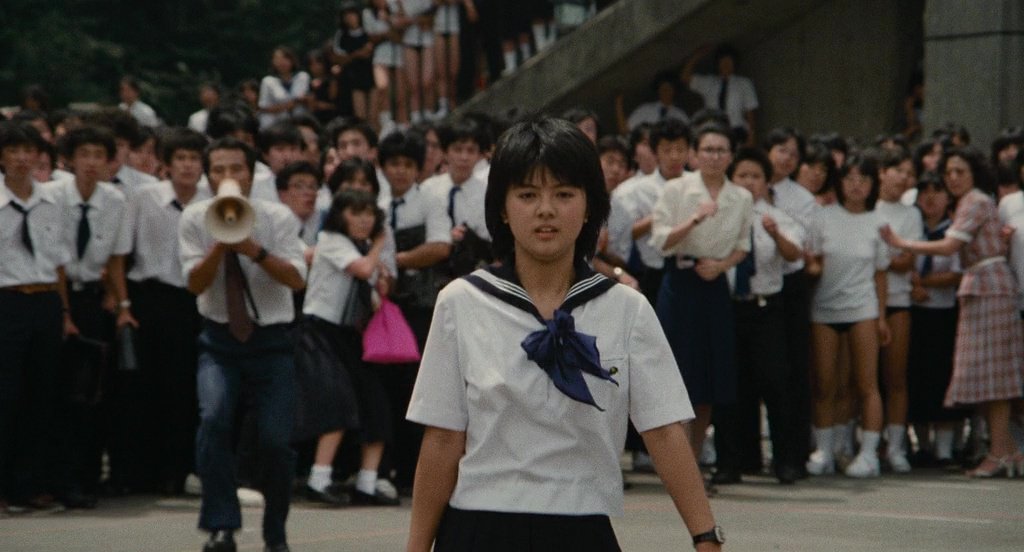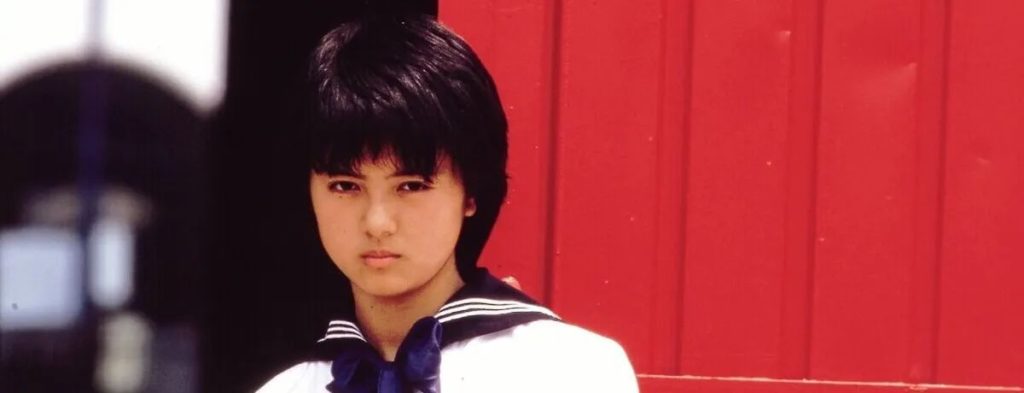Sailor Suit and Machine Gun
March 17, 2022 · 0 comments
By Tom Wilmot.

When was the last time you picked a movie to watch solely based on its title? This was the case when I saw that Arrow Video would be releasing Shinji Somai’s 1981 film, Sailor Suit and Machine Gun. The film is as strange as its title implies, although perhaps not in the wacky way you might expect. The release marks the first of Somai’s titles to be released on home media in the West, and there’s hardly a better place to start given the nature of this idol-starring, genre-bending romp.
The recently orphaned Izumi Hoshi (Hiroko Yakushimaru) leaves school one day only to be met at the gates by suited men who whisk her away to the lair of a local yakuza faction. Once there, she’s informed that she’s the next in line to be their boss and must take up the mantle to prevent the gang from disbanding. In the interest of keeping her dramatic new acquaintances from, as they put it, going out in a blaze of glory, Izumi begrudgingly accepts her new position and takes on all the flack that it comes with.
There are few things stranger than seeing the young Hiroko Yakushimaru storming a yakuza stronghold, sub-machine gun in hand, with a pair of rowdy gangsters at her side. Yet, this is exactly the kind of image you have the pleasure of seeing when you watch Sailor Suit and Machine Gun. Oddly enough, this instance marks one of the more straightforward moments in the narrative, with Izumi and her underlings also enjoying drunken motorbike rides and hideout redecorating in between drug disputes and stints of turf warfare. To say that the plot is overstuffed would be a tremendous understatement, at least where the theatrical cut is concerned – Somai’s “complete version” from 1982, which is also included in this release, sees the addition of several extra scenes.

The film is a mish-mash of yakuza antics and typical coming-of-age melodrama. The former is presented in a parody-like fashion, with the film borrowing from the gritty yakuza flicks of the preceding decade. Izumi’s gang members are fairly feckless, with none of them being particularly threatening or taking themselves too seriously as criminals. In this way, they’re easier to accept as the fiercely loyal acquaintances of an underaged female boss. Izumi’s newly found life of crime plays out against the growing pains of being a teenaged girl and dealing with all that comes with that anxious period of life. The young boss is forced to adjust to life’s harsh realities while riding with the yakuza. It’s a premise you’d expect to be quite tongue in cheek, but aside from the more overtly comical moments, it’s one that Somai appears to play completely straight.
Where the film falls in on itself is in its tonal and narrative imbalance. The plot treads the line between silly yakuza parody and wholehearted coming-of-age flick but never quite marries the two. Scenes that seem ridiculous on paper are presented with the utmost sincerity, leaving you bemused as to the filmmaker’s intentions. One moment that comes to mind, in particular, is when Izumi is captured by the legless bond-villain archetype, Fatso, who not long after torturing the young boss joins her for a balcony dining session, during which she dons a flamboyant pink dress. These jarring narrative shifts are confounding and leave you uncertain on how to feel. Somehow, despite the implications of its title, the film manages to be even more baffling than you might imagine.

Whatever your thoughts on the narrative, one thing for sure is that Somai’s direction is absolutely magnificent. The film has a series of long-takes, for which the director was renowned, that see the camera glide into several different positions throughout any given scene. One example of this stunning cinematography comes during a conversation between Izumi and her dead father’s lover, Mayumi. As the two chat at a bar, the camera examines their reflections against a faraway mirror before retreating to the bar and then being pulled back further still, outside the building. Such instances of mesmerising camerawork add to the occasional dreamlike ambience and showcase Somai for the skilled director he was.
It’s impossible to talk about Sailor Suit and Machine Gun without noting the performance of 17-year-old idol Hiroko Yakushimaru. The teen had worked with Somai before on his 1980 film The Terrible Couple but was still in full-time education when their next project came around. In a supplemental interview, actor Akira Emoto fondly remembers that the young idol would often come to the set straight from school already wearing her own sailor suit uniform! Despite her age, the teen carries herself brilliantly and becomes a commanding presence in the latter stages of the film. Yakushimaru, who is now better known as a singer than actor, also sang the film’s main theme song, which was already a huge hit a couple of months before the theatrical release.
Delving into Somai’s career further is the documentary Girls, Guns, and Gangsters: Shinji Somai & Sailor Suit & Machine Gun. The 50-minute featurette is comprised of interviews with a handful of film industry figures who either worked with Sômai on the film or are experts on his productions. These interviews give us an idea of the intensity and meticulous processes of the director, who passed away in 2001. Assistant director Koji Enokido details one long-shot sequence that was particularly challenging but had to be done Somai’s way. Everyone speaks fondly of the late director and notes the strangeness of what is arguably his most famous film. There’s a sad undercurrent to the discussion, as you get the feeling that Somai is still due proper recognition in the global film community, which is something that may come down the line if releases such as this continue. As it stands, this short documentary serves as a thorough introduction to Somai’s work and the lasting impact of his sophomore feature.

As is custom with the first-pressing of Arrow releases, Sailor Suit and Machine Gun comes with a booklet that contains a couple of essays. The first is from the Yale University professor of East Asian cinema and culture, Aaron Gerow, who highlights the importance of contradiction in Somai’s work. He places particular focus on Izumi and explores how the character’s various incompatible roles are presented throughout the film. Also chiming in with a brief history of Kadokawa Productions is Alexander Zahlten, professor of East Asian Languages and Civilizations at Harvard University. Zahlten accounts the unlikely success story of Kadokawa Publishing’s venture into film production and details the company’s pioneering of the revolutionary strategy known as “media mix”.
There is also a transcribed discussion from a newly recorded conversation between Hiroko Yakushimaru and internationally acclaimed director Kiyoshi Kurosawa – the latter worked on Sailor Suit as fourth assistant director at the beginning of his career. The pair have a long and fascinating discussion centred around Somai’s difficult character on set. They both recall the harsh treatment that Yakushimaru endured from the director and his gruelling methods that often involved countless rehearsals. The conversation is very revealing and serves as a fantastic addition to this supplement-heavy release.
I would describe Sailor Suit and Machine Gun as a film to be experienced rather than merely watched. It’s a tonally muddled and occasionally dumbfounding mash-up of genres that’s undeniably messy in narrative execution. However, there’s a charm to the bizarre chain of events and enough intrigue concerning the individual plot elements to make the film a worthwhile watch for the curious. The late Shinji Somai’s graceful direction is entirely worthy of praise, as is the strong performance from Hiroko Yakushimaru, who would go on to be a household name. Regardless of where you come down on the film’s quality, the fact that we can enjoy a boutique release for the likes of Sailor Suit and Machine Gun and enjoy all the discourse that comes with it is truly exciting. Here’s hoping that this Blu-ray paves the way for further exploration of Shinji Somai’s varied filmography.
Sailor Suit and Machine Gun is released on Blu-ray from Arrow Films.
Leave a Reply